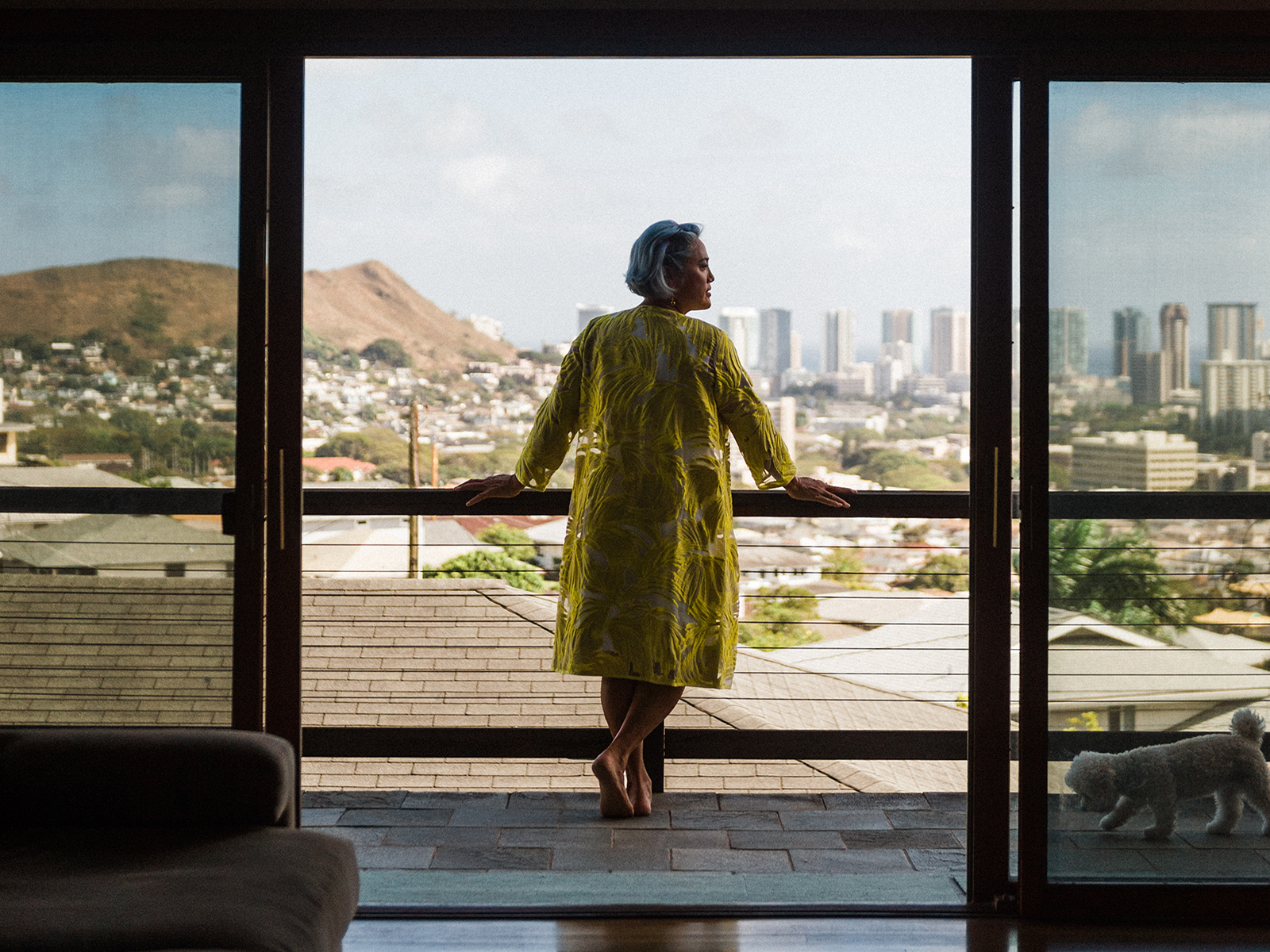With 25 years of stomping in the streets and championing change, Kim Coco Iwamoto continues fighting for disenfranchised communities.
Text by Mitchell Kuga
Images by John Hook
Kim Coco Iwamoto knows she cuts a formidable figure in Hawai‘i politics. “My presence in a room makes sphincters tighten,” she says, before breaking out in laughter. “In Hawai‘i, I’m such a known entity that people aren’t going to say anti-trans rhetoric in front of me. I never have to discuss being trans, I never have to out myself or speak as an out person.”
That respect is largely based on her more than 25 years of advocating for the most vulnerable communities. She started rallying in the ’90s, stomping in the streets of New York City with The Transexual Menace, a grassroots organization protesting anti-transgender violence.
Fighting for the Cause
After earning a law degree from the University of New Mexico, she leveraged her radically progressive beginnings into legislative action, serving on the Hawai‘i State Board of Education, where she amended policies to protect LGBTQ students from bullying; the Hawai‘i Civil Rights Commission, where she expanded the rights of LGBTQ families; and the Victory Institute, a national organization dedicated to elevating LGBTQ leaders.
After running for lieutenant governor in 2018 as a democratic socialist, Kim Coco continues fighting for causes that elevate people over profit, like increasing the state’s minimum wage, halting the development of the proposed Thirty-Meter Telescope on Maunakea, and funding cleaner energy alternatives to fossil fuels.
In 2013, the Obama White House recognized Kim Coco as a Champion of Change, a title honoring those who have helped “our country rise to meet the many challenges of the 21st century.”
My presence in a room makes sphincters tighten.”
In 2006, Kim Coco made history as the highest-ranking openly-transgender elected official in the country after winning a seat on the Hawai‘i State Board of Education. The swell of national media attention she received in the aftermath, though framed as celebratory, often felt “very othering and objectifying,” she says, a fixation on her identity at the expense of her merits.
“I don’t know if I feel proud to be trans, or proud to be Japanese American—I just am,” says Kim Coco, who was born on Kaua‘i and raised on O‘ahu. “I’m not ashamed, you know what I mean? But it has nothing to do with my achievements.”
Candid Conversation
When we spoke over the phone in March 2019, Kim Coco, 50, was by turns candid and astute. As she shepherded her 6-year-old daughter home from the chaos of her school’s ho‘olaule‘a (celebration), Kim Coco opened up about being the class president of her all-boys school, the transition she made from fashion to politics, and being a single mother.
What were you like as a kid?
Um, I guess I was really irritating. (Laughs) I was not shy. I was super flamboyant and put myself out there. I remember once the dean of our class tried to ask me to tone it down. Apparently, at a high school dance a parent who was chaperoning pointed at me like, What is going on there? This was the early ’80s, so it was a lot of androgynous makeup, Norma Kamali shoulder pads, a cinched waist. I was so femmed out that the boys who came over from Damien High School would ask me to dance—they didn’t know I was the class president of Saint Louis [an all boy’s school].
How did you respond to being told to tone it down?
Very dramatically. I went home right after he spoke to me and—this is back when we had typewriters—wrote this letter of resignation that said my class voted for me exactly as I am. The next day, I gave a copy of this letter to the principal, the board of trustees, and to every single administrator. Everyone got a copy, it was so overly dramatic.
Did it work?
By the end of the afternoon the dean apologized to our class advisors for the comments he made to me and said I should be exactly who I am and stay on as class president. I was like, yeah, and the next time a parent raises concerns you’ll be prepared. (Laughs) I was a total diva by the age of 14.
So it sounds like you were popular?
Mmmm…
Well, I guess being class president doesn’t necessarily mean you were popular, but it means people voted for you.
Well, they knew who I was. (Laughs)
After graduating you moved to New York to study and work in fashion. How did you transition into politics?
Well, I got terminated from a job in fashion. I graduated from the Fashion Institute of Technology and worked for this small boutique design house in New York City—my dream job. One day, my employer told me that her largest corporate client was not comfortable working with me because I’m trans, that I was basically a liability to her. It was a constructive termination: She started denying me certain benefits and stuff.
So I went to a community legal clinic at the LGBT center and sought counsel. I discovered there were no protections for me in the law at the time. In fact, I found out I could even be counter-sued for slander. It shifted the whole awareness I had about who the laws were set up to protect. That’s when I realized that instead of fashion I needed to go to law school.
Prior to being terminated, were you engaged with LGBTQ issues?
Well, truthfully, when I was working in the fashion industry, I just saw my life on a trajectory of fabulousness, you know? (Laughs) Like that was the life I was striving for. I wasn’t striving to make a positive impact in the world or for my community. In fact, I didn’t even know that the trans community even needed any kind of support, because my father—who ran the family company, Roberts Hawaii Tours—employed trans people. And they were in positions of leadership, they were supervisors. Growing up in Hawai‘i, it wasn’t a big deal. It felt like you could achieve things.
I don’t know if I feel proud to be trans, or proud to be Japanese American—I just am.
Speaking to The Advocate, you said “Here in Hawai‘i, the LGBT movement is often seen as an outsider issue.” Can you elaborate on that?
For those of us who were born and raised here, we had a lesbian auntie, a gay uncle. We worked with trans people. The roles we play in the community are based on relationships: relationship to place, to community, to what school you grad. All that stuff contextualizes us. LGBTQ civil rights issues, in general, are framed as individual rights and liberties, not familial rights. A lot of people relocate here from the mainland and their identity is strongly connected to being away from family and feeling this independence. As a result, you saw a disproportionate number of LGBT non-locals in the formal movement.
We also have to recognize that certain cultures feel much more comfortable asserting verbally, so unless we make room for those quieter voices, the media loves picking up on the assertive ones. We have to be conscious that this is a concept being imposed on Hawai‘i by mainland people and the media.
What made you decide to run for elected office?
I was a foster parent and my kids, who are on the spectrum of trans and queer, were being bullied in school. These kids were from Wai‘anae, Kalihi, Kāne‘ohe, and one was sort of abandoned in Hawai‘i by parents on the mainland. They were picked up for truancy and forced to go to school, yet no one was keeping them safe from bullying and harassment, so they asked me to testify to the Board of Education. After doing so, I realized they needed someone on the inside.
Growing up, was it always Kim Coco?
My one uncle used to call me Coco Palm, because I was named after the Coco Palms Resort. That was my nickname.
The fact that your parents named you Kim Coco is almost too good to be true.
It’s funny because to all the Cocos I meet who are trans, I’m like, “I think I might be the only one who was born Coco—sorry!”
And now you’re a full-time mother?
Yes, I adopted Rory three years ago, from China. I basically came home from a party drunk and saw her on Facebook, and then nine months later she was in my arms—kind of a subversion of that person who drunkenly gets knocked up. (Laughs) But, no, a friend of mine works at one of the international adoption agencies here in Hawai‘i and sent me Rory’s photos.
What is it like being a single mother?
It’s a lot, but I’m so grateful that I’m doing it at this age. I’m just calmer. I feel like it’s the right time for me to do this. And she happens to be so smart and funny and quite a delight. She loves sports, singing, and travel. Today is her first day of spring break, so we’re going to be traveling to some of the other islands.
Growing up, was there ever a period in your life when you felt like you had to hide who you were?
This was always me. That’s why when people ask, “When did you transition?” I’m like, “You know what? I don’t actually see my life like that. I feel like I’ve always been me.” Who I am has always been different. I have four brothers and I’ve always looked different. Having the name Kim Coco set me apart from my brothers.

